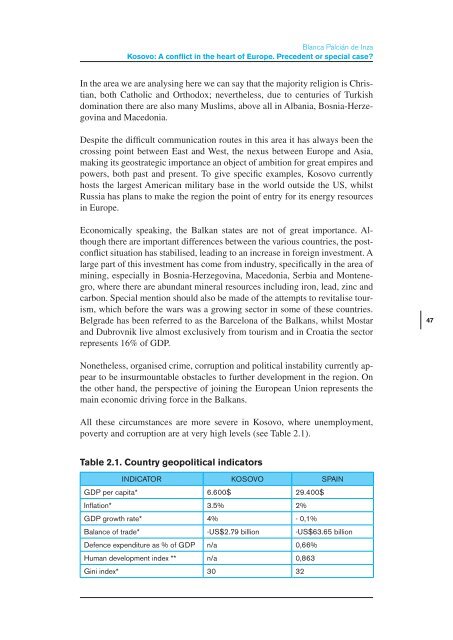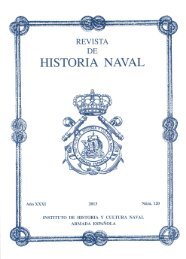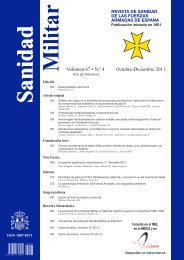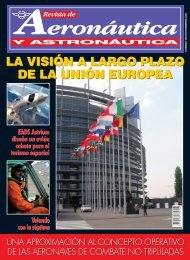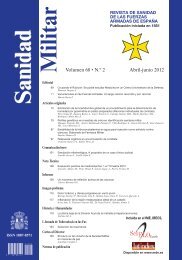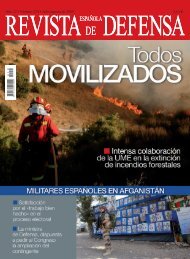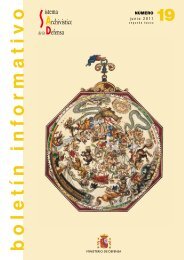GEOPOLITICAL OVERVIEW OF CONFLICTS 2011 - Portal de ...
GEOPOLITICAL OVERVIEW OF CONFLICTS 2011 - Portal de ...
GEOPOLITICAL OVERVIEW OF CONFLICTS 2011 - Portal de ...
You also want an ePaper? Increase the reach of your titles
YUMPU automatically turns print PDFs into web optimized ePapers that Google loves.
Blanca Palcián <strong>de</strong> Inza<br />
Kosovo: A conflict in the heart of Europe. Prece<strong>de</strong>nt or special case?<br />
In the area we are analysing here we can say that the majority religion is Christian,<br />
both Catholic and Orthodox; nevertheless, due to centuries of Turkish<br />
domination there are also many Muslims, above all in Albania, Bosnia-Herzegovina<br />
and Macedonia.<br />
Despite the difficult communication routes in this area it has always been the<br />
crossing point between East and West, the nexus between Europe and Asia,<br />
making its geostrategic importance an object of ambition for great empires and<br />
powers, both past and present. To give specific examples, Kosovo currently<br />
hosts the largest American military base in the world outsi<strong>de</strong> the US, whilst<br />
Russia has plans to make the region the point of entry for its energy resources<br />
in Europe.<br />
Economically speaking, the Balkan states are not of great importance. Although<br />
there are important differences between the various countries, the postconflict<br />
situation has stabilised, leading to an increase in foreign investment. A<br />
large part of this investment has come from industry, specifically in the area of<br />
mining, especially in Bosnia-Herzegovina, Macedonia, Serbia and Montenegro,<br />
where there are abundant mineral resources including iron, lead, zinc and<br />
carbon. Special mention should also be ma<strong>de</strong> of the attempts to revitalise tourism,<br />
which before the wars was a growing sector in some of these countries.<br />
Belgra<strong>de</strong> has been referred to as the Barcelona of the Balkans, whilst Mostar<br />
and Dubrovnik live almost exclusively from tourism and in Croatia the sector<br />
represents 16% of GDP.<br />
47<br />
Nonetheless, organised crime, corruption and political instability currently appear<br />
to be insurmountable obstacles to further <strong>de</strong>velopment in the region. On<br />
the other hand, the perspective of joining the European Union represents the<br />
main economic driving force in the Balkans.<br />
All these circumstances are more severe in Kosovo, where unemployment,<br />
poverty and corruption are at very high levels (see Table 2.1).<br />
Table 2.1. Country geopolitical indicators<br />
INDICATOR KOSOVO SPAIN<br />
GDP per capita* 6.600$ 29.400$<br />
Inflation* 3.5% 2%<br />
GDP growth rate* 4% - 0,1%<br />
Balance of tra<strong>de</strong>* -US$2.79 billion -US$63.65 billion<br />
Defence expenditure as % of GDP n/a 0,66%<br />
Human <strong>de</strong>velopment in<strong>de</strong>x ** n/a 0,863<br />
Gini in<strong>de</strong>x* 30 32


